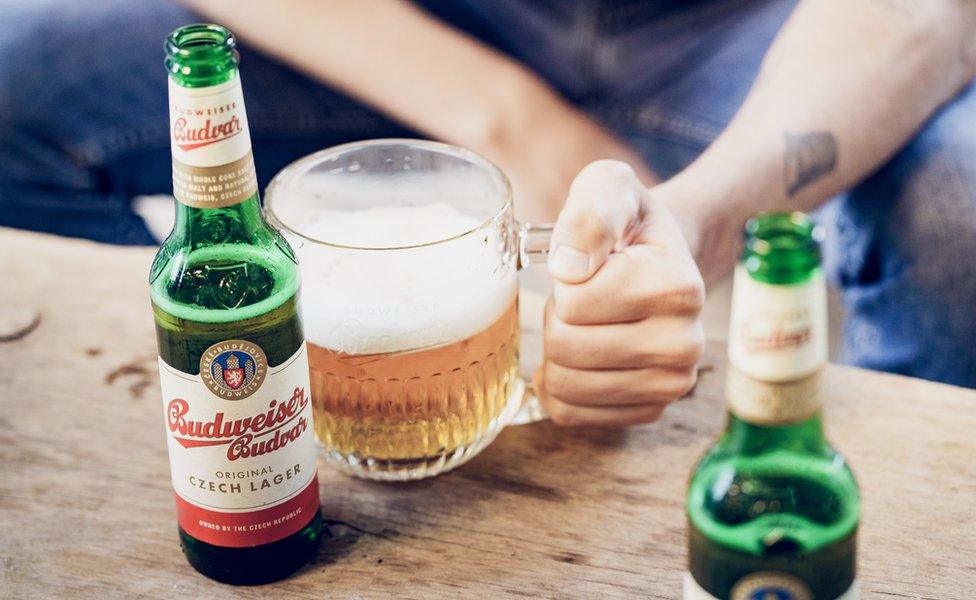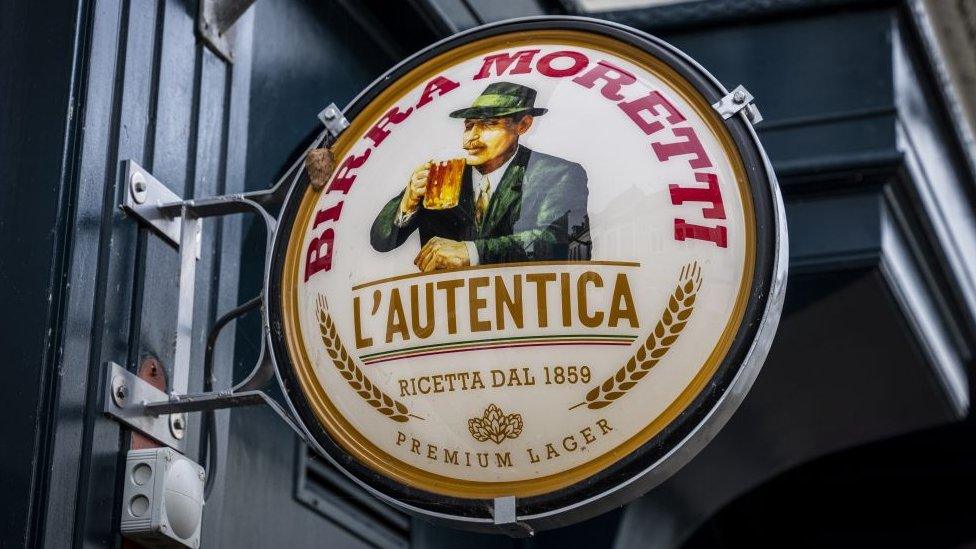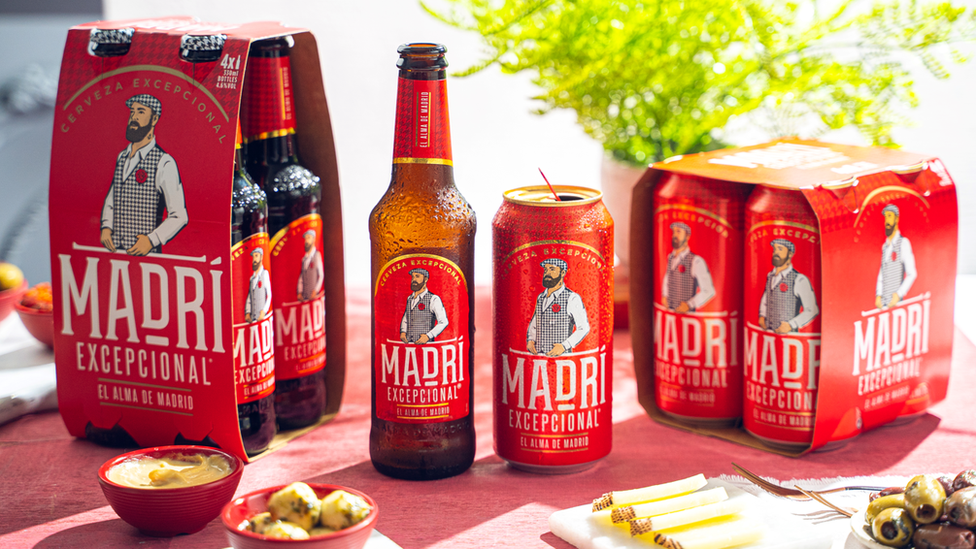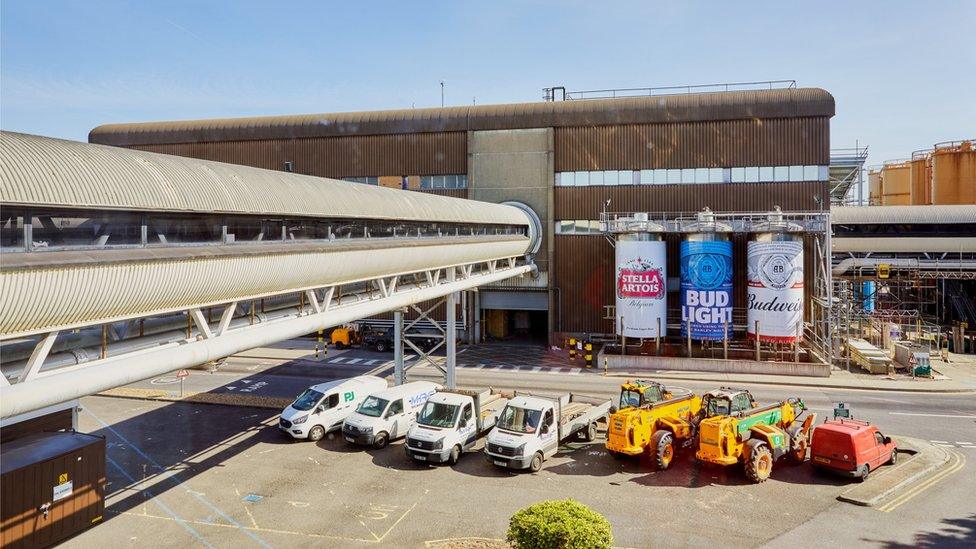Italian label maybe but the beer's British brewed
- Published
- comments

Budvar head brewer Adam Brož says that making beer is an art form
Budweiser Budvar's head brewer, Adam Brož, says the popular Czech lager will never be brewed outside of its hometown.
"There is no way we could brew elsewhere in the world and still be considered authentically Czech," says Mr Brož who is only the 10th person to be in charge of brewing at Budvar since it launched 127 years ago.
"Firstly there are the ingredients. To be authentic you need quality, local Czech ingredients... and there is no other place with identical water [like our brewery's natural well].
"Secondly, there is the equipment of the brewery... if you have two breweries, they won't always have exactly the same geometry or size etc, and you could end up with significant differences despite using the same recipe."
Lastly, he says brewing has "an artistic aspect", which can be lost if a beer is also brewed elsewhere by a different team.

Budweiser Budvar was one of very few Czech breweries not to be privatised following the fall of communism
Based in the Czech city of České Budějovice, Budweiser Budvar gets its name from the old German name for the city - Budweis.
Owned by the Czech government, it should not be confused with its namesake, the US lager Budweiser. That is an entirely separate brand owned by the world's largest brewing group, Anheuser-Busch InBev (AB InBev).
What makes Budvar increasingly rare among lagers sold around the world, is the fact it is only brewed in its country of origin.
By contrast, if you look at the list of the 10 best-selling beers in the UK this year,, external all lagers, eight of them are foreign brands which are brewed under licence in the UK - Carling (originates in Canada), Fosters (Australia), Birra Moretti (Italy), Coors (US), Stella Artois (Belgium), Carlsberg (Denmark), San Miguel (Philippines), and Amstel (Netherlands).
So if you are sitting in a UK pub, drinking a cold pint of Moretti while daydreaming about Italy, your drink was actually produced at a brewery in Manchester. Meanwhile, your crisp pint of Stella is from South Wales.
But unless you are a beer snob, does this blurred provenance actually matter?

Birra Moretti's production is not limited to Italy
The world's largest brewing companies are quick to point out that it is far more environmentally friendly to brew their best-selling brands at numerous breweries around the world, rather than have to ship the billions of litres of finished beers per year all the way from their original country of origin. It is also far more cost-effective.
Molson Coors is a case in point. It sells an increasingly popular Spanish lager called Madrí Excepcional, which for the UK market is brewed in Yorkshire.
"Madrí Excepcional is a collaboration between our Molson Coors master brewers here in the UK and at La Sagra Brewery, our joint venture partner based near Madrid," says Fraser Thomson, the company's western Europe operations director.
"We continue to work closely with the team at La Sagra, but brewing Madrí Excepcional here in the UK enables us to deliver efficiently, more sustainably - reducing the miles travelled from brewery to bar or shelf, and quickly respond to demand. And all our beers in the UK are produced using 100% renewable electricity."

Sales of Madrí Excepcional have soared in the UK in recent years, but how Spanish is it?
AB InBev's British and Irish operation is called Budweiser Brewing Group UK & Ireland. It brews its brands, including US Budweiser, Stella Artois, Becks (originally German) and Corona (Mexican), at its brewery in Magor, near Newport, in South Wales.
A spokesperson for the company says such a "local" approach is both more environmentally sustainable and allows it to supply the freshest, best-quality beer.
"And since January 2021, every bottle, can and keg of Budweiser in the UK has been brewed with 100% renewable electricity. To make this possible, Budweiser Brewing Group UK&I built two solar farms and a wind turbine to power its Magor Brewery."
The company also sources all of its barley from UK farms. "This helps us reduce carbon emissions and champions British agriculture - both of which are core to our local sustainability efforts," adds the spokesperson.

Budweiser Brewing Group UK&I highlights its use of renewable energy and British barley
It is a similar picture at Dutch global brewing giant Heineken, which for the UK market produces 90% of its beers, including Moretti, at British breweries, using 100% renewable electricity.
"Birra Moretti is brewed all over the world to the same 'l'autentica' recipe, using the same ingredients and crafted to the same quality standards," says a Heineken UK spokesman. "The global master brewer for Birra Moretti oversees the brewing to make sure that the beer tastes just as it should.
"Quality and taste are incredibly important to us and the millions of people who also enjoy a Birra Moretti. There are also a number of other benefits to brewing in the UK - it is more sustainable, and it provides UK jobs both in the brewery and the wider supply chain, and, therefore, contributes to the British economy."

Global Trade

Yet why are so many British lager drinkers attracted by a foreign brand name? Business psychologist, Stuart Duff of UK practice, Pearn Kandola, says it is an "aspirational" decision.
"While we like to believe that our choice is based on logic - the quality of the lager - the reality is that we can associate foreign lagers with exotic and aspirational qualities," he says.
"We associate foreign lagers with other, entirely unrelated, factors related to that country, such as fashion, cars, architecture - mainly cool and stylish. It gives the drinker a feeling that they are drinking something much more special, interesting and classier than a local UK brew, despite the lager in question often actually being brewed here too."

Budweiser Budvar, says that its brewery, pictured, has a unique water source
Beer writer Jane Peyton says as most global beer brands are lagers with "a similar flavour profile", the brewers need to highlight a particular brand's "heritage, or invented heritage" to differentiate it from the crowd. Often this highlighted heritage means that they can charge a higher price for the beer in question, she adds.
"What the consumer thinks they are buying is a leading beer made in Mexico, Spain, or Italy, but it might say in small type that it was brewed under licence elsewhere," she says. "Yet most people do not check.
"Would they buy that beer, and be willing to pay a premium for it, if they knew it had been brewed in a regional British town alongside non-premium beers with the same ingredients?"
Back at Budweiser Budvar, its UK managing director Jitka Vlčková says the company will continue to absorb the higher transportation costs of shipping all of its beer from Budweis, Czech Republic.
"The cost of compromising our quality, values and traditions would be far higher," she adds.